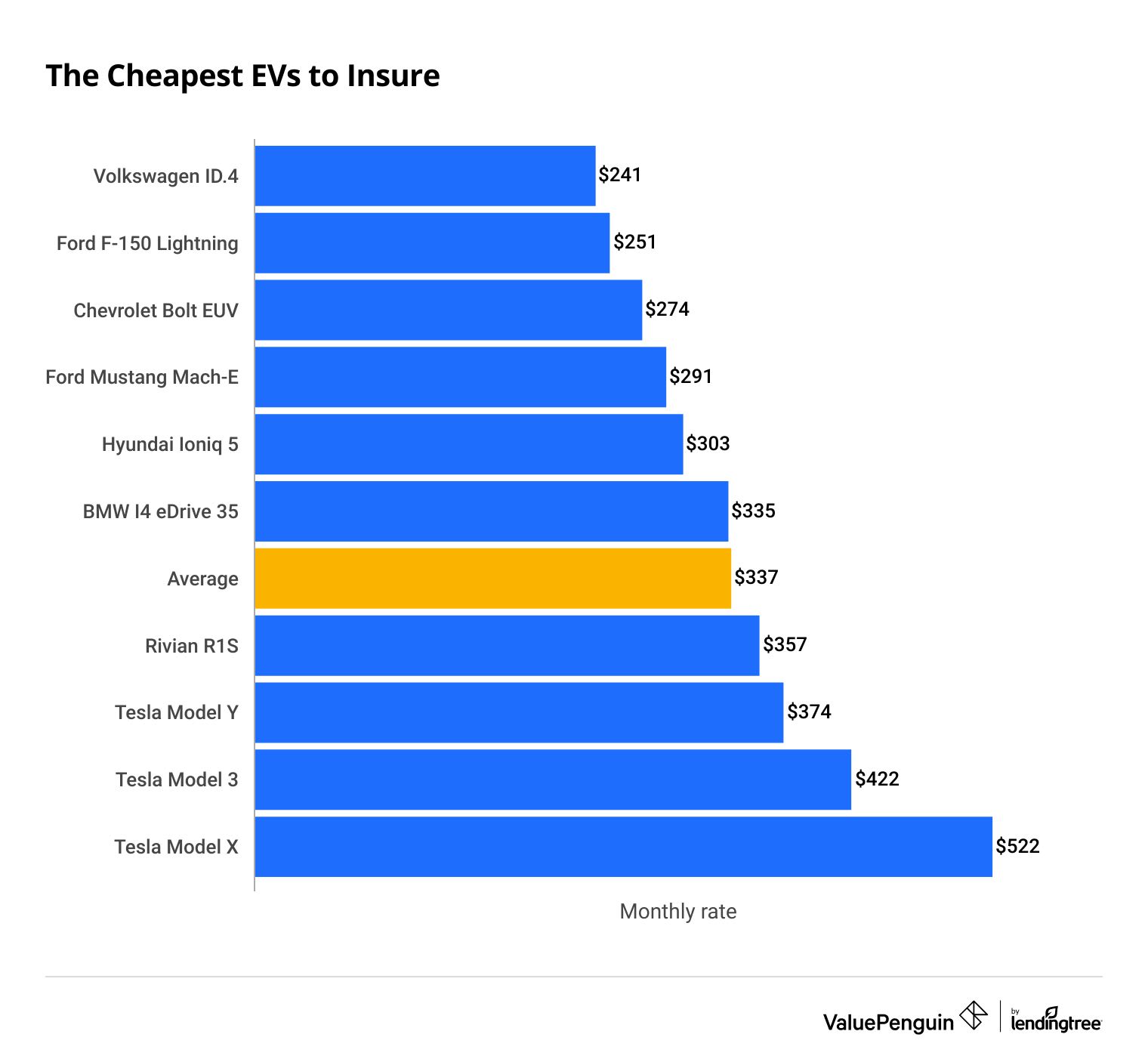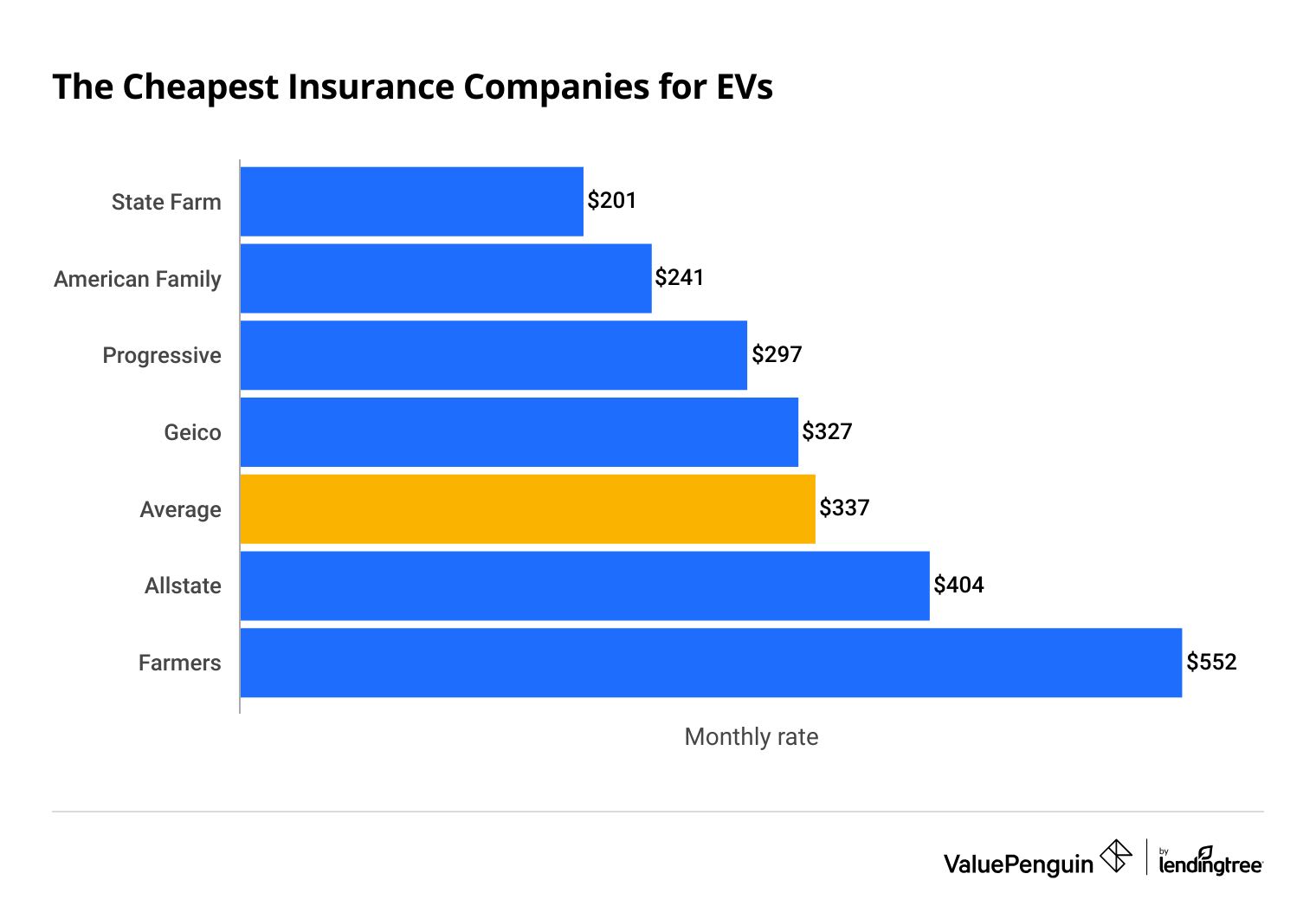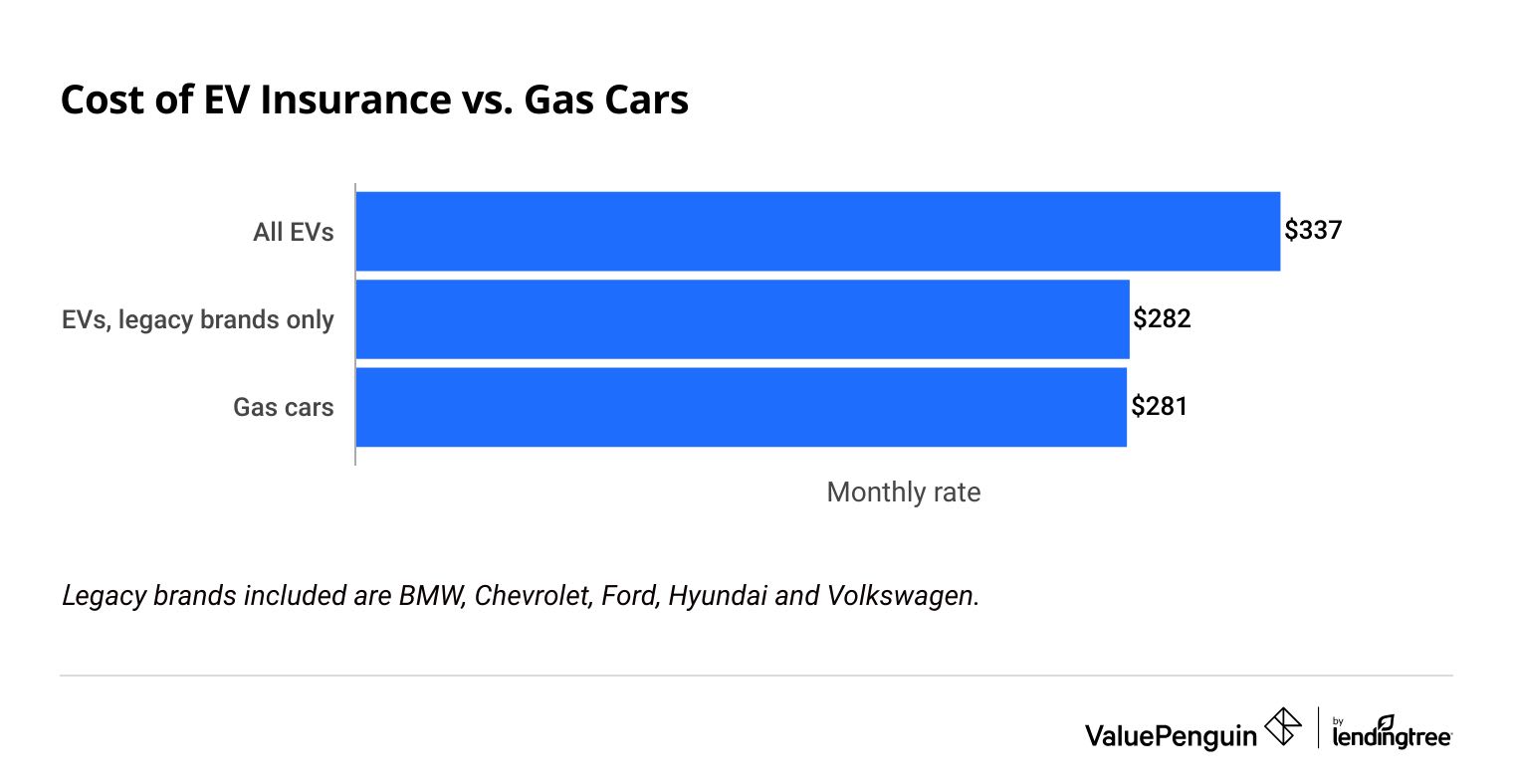How Much Does Electric Car Insurance Cost?
On average, car insurance for an electric car is about $337 per month, or $4,043 per year.
It costs about 20% more to insure an electric vehicle (EV) than a gas vehicle, mostly because EVs cost more to buy and repair.
The cheapest electric vehicle to insure is the Volkswagen ID.4, while the most expensive is the Tesla Model X.
It's cheaper to insure EVs made by companies that also sell gas cars, like Ford and Volkswagen. Rates for EV-only companies like Tesla and Rivian are much higher.
Find Cheap Auto Insurance Quotes Near You
Electric car insurance cost
It costs $337 per month on average to insure an EV, but the price changes dramatically based on which model you choose. The cheapest EV to insure, the Volkswagen ID.4, is just $241 per month, while a Tesla Model X costs more than twice as much, at $522 per month.

Electric car insurance cost by make and model
Model | Monthly cost |
|---|---|
| Volkswagen ID.4 | $241 |
| Ford F-150 Lightning | $251 |
| Chevrolet Bolt EUV | $274 |
| Ford Mustang Mach-E | $291 |
| Hyundai Ioniq 5 | $303 |
| BMW I4 eDrive 35 | $335 |
| Rivian R1S | $357 |
| Tesla Model Y | $374 |
| Tesla Model 3 | $422 |
| Tesla Model X | $522 |
Cheapest car insurance companies for electric cars
State Farm is the cheapest insurance company for electric vehicles, at $201 per month. That's 40% less than the average rate across all insurers.
American Family also has affordable rates, with an average price of $241 per month among top EVs.

Find Cheap Car Insurance Quotes Near You
Cheapest car insurance companies for electric vehicles
Insurer | Monthly cost | |
|---|---|---|
| State Farm | $201 | |
| American Family | $241 | |
| Progressive | $297 | |
| Geico | $327 | |
| Allstate | $404 | |
| Farmers | $552 |
A great way to find cheap car insurance for your electric vehicle is to get quotes from multiple car insurance companies.
What about Tesla Insurance?
Tesla operates its own insurance program, called Tesla Insurance. If you own a Tesla and live in a state where it's available, Tesla Insurance is worth a look: It's often much cheaper than other insurance companies when insuring a Tesla.
Keep in mind that unless you live in California, you're required to use your Tesla's built-in telematics system, Tesla Safety Score, in order to get coverage. It works similarly to other telematics programs, except that Tesla Safety Score has a much bigger impact on your rates.
While most insurance companies consider things like your claim and accident history, Tesla only considers your Safety Score. As a result, one instance of hard braking or driving late at night could raise your rates significantly.
Gas vs. electric car insurance costs
Car insurance for an EV is about 20% more expensive than the cost to insure a car with a gas engine.
But insurance rates have dropped significantly over the past few years, especially for more established carmakers.
Among the top 10 EVs in the U.S., those sold by a company that also makes gas-powered cars cost an average of $282 per month. That's the exact same price per month as the average price among the top 10 gas cars nationwide.
In fact, an EV may be cheaper to insure than a gas car for some models.
The average cost to insure a Ford F-150 Lightning is $251 per month. That's $6 less each month than the rate for a regular F-150. And at State Farm, the cheapest company for EVs, the Lightning costs 11% less to insure than the gas version.
Ford said that it deliberately kept the design of the F-150 Lightning similar to the gas-powered F-150 to reduce the cost of the truck — and that likely contributes to lower repair costs as well.

Gas vs. electric car insurance costs
Car type | Monthly premium |
|---|---|
| All EVs | $337 |
| EVs, legacy brands only | $282 |
| Gas cars | $281 |
Why do electric cars cost more to insure?
Car insurance costs can be higher for electric cars because EVs tend to cost more to repair or replace after a car accident.
However, the cost to insure an EV depends heavily on which brand of car you buy. Electric vehicles sold by a company that also sells gas cars are about $282 per month to insure. Meanwhile, insuring a Tesla or Rivian costs $419 per month, or 48% more.
Repair costs tend to be higher for cars designed by newer companies, and parts for Teslas and Rivians are more expensive and harder to get.
If you're looking to buy an EV with affordable insurance, you're best off starting with a car made by a traditional carmaker, not a company that was founded just to make EVs.
How to save money with an electric car
While EVs typically cost more to insure, there are financial benefits to owning an electric car. For example, charging an electric car typically costs much less than filling up a car with gas.
You could save money on fuel costs with an EV, with savings averaging between $3,000 and $10,500 throughout the car's lifetime.
Along with cheaper fuel costs, your electric vehicle might qualify you for a tax credit of up to $7,500, depending on your state, income, car make and model and the cost of your EV.
Methodology
Average price calculations used insurance rate data from Quadrant Information Services. The insurance rates were publicly sourced from insurer filings and should only be used for comparative purposes. Your actual rates may be different based on your location, age, driving record and other factors.
ValuePenguin collected insurance quotes for the top 10 electric vehicles in 2023 by sales volume.
- Tesla Model Y
- Tesla Model 3
- Chevrolet Bolt EUV
- Ford Mustang Mach-E
- Volkswagen ID.4
- Hyundai Ioniq 5
- Rivian R1S
- Ford F-150 Lightning
- Tesla Model X
- BMW I4 eDrive 35
To compare prices with standard cars with a combustion engine, ValuePenguin also collected rates for the top 10 gas-powered cars of 2023.
- Ford F-150
- Chevrolet Silverado 1500
- Ram 1500
- Toyota RAV4
- Honda CR-V
- Toyota Camry
- GMC Sierra 1500
- Nissan Rogue
- Jeep Grand Cherokee
- Toyota Tacoma
All insurance quotes are statewide averages from the state of Illinois and have full coverage with $500 comprehensive and collision deductibles.
Editorial Note: The content of this article is based on the author's opinions and recommendations alone. It has not been previewed, commissioned or otherwise endorsed by any of our network partners.





